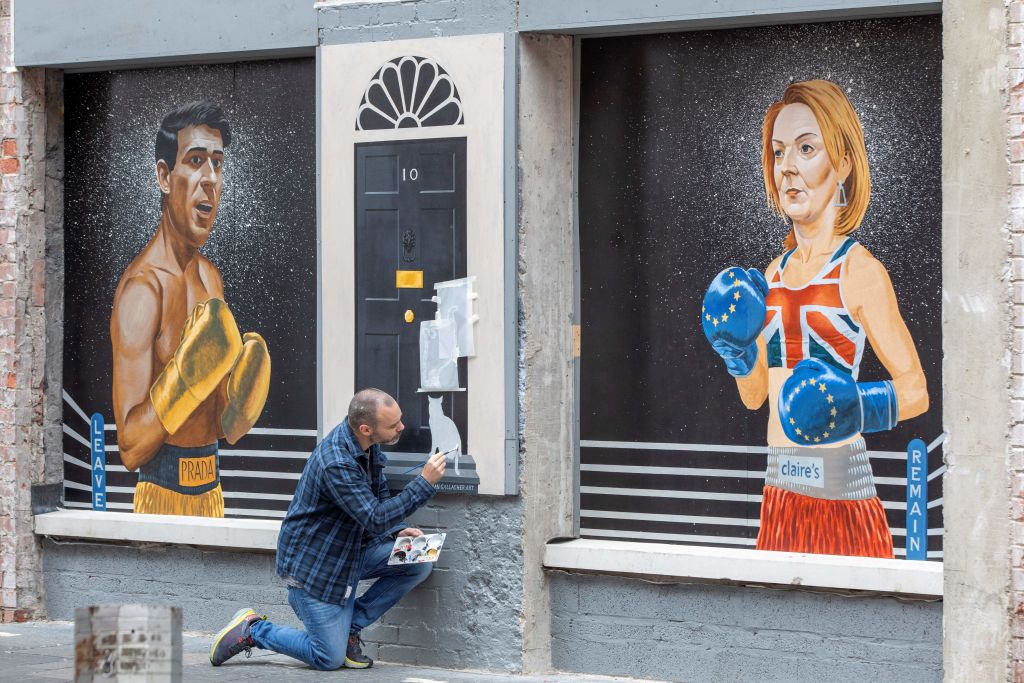Happy Friday! This is what happens when mere humans attempt feats suitable only for mascots:
Quick Hits: Today’s Top Stories
Federal Magistrate Judge Bruce Reinhart indicated yesterday he is inclined to release at least part of the affidavit explaining the basis for the FBI’s recent search of Mar-a-Lago, ordering the Justice Department to propose redactions to the document by next Thursday. Jay Bratt, the DOJ’s top counterintelligence official, argued releasing the affidavit could compromise the agency’s investigation—which he said was “in its early stages”—by jeopardizing witnesses and revealing a “roadmap” of future steps.
The Office of the U.S. Trade Representative announced Wednesday the United States and Taiwan will begin negotiations on a bilateral trade and investment initiative in the coming weeks that will focus on labor, environmental, and anti-corruption standards, agriculture and digital trade, and—in a not-so-subtle reference to China—“distortive practices of state-owned enterprises and non-market policies and practices.” A Chinese Foreign Ministry spokesman condemned the news, arguing it would send the wrong signal to “Taiwan independence separatist forces.”
Finland’s Defense Ministry announced yesterday it is launching an investigation after two Russian MiG-31 fighter jets were suspected of violating Finnish airspace over the Gulf of Finland Thursday morning near the southern coastal city of Porvoo. Russia’s Defense Ministry said yesterday it had relocated three MiG-31E warplanes equipped with Kinzhal hypersonic missiles to its Kaliningrad region, but it’s unclear if the two events are related.
The National Association of Realtors reported Thursday that the median existing-home sales price in the U.S. was $403,800 in July—down from a record $416,000 in June, but up 10.8 percent from a year earlier—while sales of previously owned homes declined for the sixth straight month, down 20.2 percent year-over-year.
The Labor Department reported Thursday that initial jobless claims—a proxy for layoffs—decreased by 2,000 week-over-week to a seasonally adjusted 250,000 last week, holding steady near the measure’s highest level this year as the tight labor market continues to slacken.
A large-scale University of Oxford study released Wednesday found people who’ve contracted COVID-19 are at a higher risk of cognitive and neurological conditions like brain fog, psychosis, seizures, and dementia for up to two years after infection. Incidence of depression and anxiety was found to be heightened immediately after contracting COVID-19 as well, but those risks returned to baseline within two months of an infection.
The average number of daily confirmed COVID-19 cases in the United States has declined about 18 percent over the past two weeks according to the CDC, while the average number of daily deaths attributed to the virus—a lagging indicator—decreased approximately 11 percent. About 35,100 people are currently hospitalized with COVID-19 in the U.S., down from approximately 37,600 two weeks ago.
New Nielsen data released yesterday found that, for the first month ever, Americans in July spent more time watching television on streaming services like Netflix, YouTube, and HBO Max than they did watching cable TV. Streaming represented a record 34.8 percent of total TV consumption last month, compared to 34.4 percent for cable and 21.6 percent for broadcast.
Truss Takes the Lead for British PM

British Prime Minister Boris Johnson is making the most of his last few months in office. He promised not to make any major policy changes while his party elects a successor, and hasn’t let the stream of scandals that led to his ouster dim his summer fun. Over the last few weeks, Johnson has thrown a one-year wedding anniversary bash complete with steel drums, jetted off to Slovenia, popped back to England and attended a work meeting, and then scooted over to Greece for more vacation.
His would-be replacements have had a sweatier time of it. After several rounds of votes by MPs, rancorous debates, and town halls across the United Kingdom, former Chancellor of the Exchequer Rishi Sunak and Foreign Secretary Liz Truss are the last two candidates standing to take over Johnson’s job as leader of both the Tories and the country. An estimated 160,000 Conservative party members have begun the last round of voting, and the party will announce a winner September 5.
Although Truss barely made it through earlier rounds of the selection process, she’s now easily the frontrunner, with a YouGov poll for Sky News released Thursday giving her a whopping 32-percentage-point lead over Sunak. That’s no outlier: Another survey released this week—from ConservativeHome—found Truss ahead by an identical margin.
It’s quite the fall for Sunak. As finance minister, his wage subsidies for furloughed workers saved businesses and jobs during the pandemic, and his “Eat Out to Help Out” campaign to boost struggling restaurants won him personal popularity. But like Johnson, he was fined for breaking lockdown rules by attending Downing Street parties. And the former hedge fund analyst’s popularity plummeted in April, when voters found out his wealthy wife may have avoided as much as $24 million in British taxes by claiming non-domiciled status, and that Sunak had kept a green card allowing him to work in the United States after being appointed chancellor. Taken together, the two revelations left voters questioning whether the family planned to live in Britain long term.
(Sunak’s also made his fair share of “out-of-touch” gaffes: He was caught on video in March struggling to use a credit card to check out at a convenience store, and earlier this week he listed a particular wrap as his go-to McDonald’s order—apparently unaware it was removed from the menu more than two years ago.)
Sunak’s resignation from Johnson’s government in July—over the news that Johnson had promoted a member of Parliament despite sexual harassment allegations—helped turn the tide against the outgoing prime minister. Truss, meanwhile, stuck by Johnson while a flood of other officials stepped down. The prime minister is still fairly popular with the party faithful who are voting now, so Sunak’s “disloyalty” may prove a strike against him.
Both candidates have pledged to crack down on illegal immigration and support military spending. Truss—who’s helped lead the U.K.’s support for Ukraine—has promised to increase defense spending from its current level of about 2.1 percent of Britain’s gross domestic product to 2.5 percent by 2026 and 3 percent by 2030. Both oppose a referendum on Scottish independence.
But they differ sharply on how to respond to Britain’s inflation, which hit a 40-year high in July at 10.1 percent year-over-year, largely driven by energy prices spiking thanks to the war in Ukraine. The U.K. caps household electricity and gas prices in a bid to protect consumers from profiteering—it set the limit at about $1,500 per six months for a typical-usage household last winter. (Households that use above average pay more.) But the cap rose to about $2,300 in April, and energy regulator Ofgem warned it will rise again in October. Analysts predict it could top $5,000 in January.
Truss has promised tax cuts estimated to cost more than $35 billion a year, arguing that Britons need extra money in their pockets to deal with rising prices. She plans to reverse April 2022 National Insurance increases and a corporate tax increase planned for 2023, as well as temporarily drop green energy payments added to energy bills—a move that would save each household an estimated $180 a year.
“My view is that we can grow the pie, and having lower taxes actually helps us generate more income into the economy so there is more money to go around,” Truss said at a recent debate with Sunak. “What I fundamentally don’t agree with is putting up taxes and then also giving out benefits. I think that is the wrong approach.”
Sunak, meanwhile, helped implement the National Insurance and corporate tax hikes that Truss opposes. He’s promised to help families pay for higher energy bills caused by the war in Ukraine, but ruled out freezing the energy price cap. He also supports tax cuts—but only once inflation is firmly under control.
Sunak calls Truss’ proposals a “short term sugar rush” that will trigger a recession. “I’ve not been making lots of easy promises that I think are false,” Sunak said. “I’d rather lose than say things I don’t think can be delivered.” Based on his dismal poll numbers, he’s poised to do just that.
Worth Your Time
Everybody wants a third party, David Lewis Schaefer notes in Law & Liberty, but nobody agrees on what that third party should look like. And for all its faults, Schaefer argues, two-party systems have plenty of advantages: They tend to produce more stability and force more workable compromises to win elections than fractured parliamentary systems. “Those who seek to promote the rise of a true third party are deluding themselves in thinking that it would yield more energetic and decisive policymaking,” he writes. “A country is far better off when its two parties each perform the function of what political scientists call ‘interest aggregation’—that is, forming a coalition of diverse interests along with ideologically-based groups—with a view to winning the election, rather than leaving that function to the legislative body. Elections create powerful incentives for compromise and negotiation. This is far more difficult to achieve in a multiparty Congress, potentially with a president who got elected—as the ‘National Popular Vote’ movement would allow—with considerably less than a majority of the electorate.”
Oklahoma has sentenced Richard Glossip to death for supposedly commissioning a murder in 1997—and has ignored evidence that suggests he’s innocent, Lara Bazelon reports for New York Magazine. After a law firm’s exhaustive review of the case, Republican state Rep. Kevin McDugle became convinced of Glossip’s innocence—and has pushed to get Glossip’s case reviewed. “McDugle, meanwhile, has tried six times to bring to a vote bills that establish more legal protections for death-row inmates,” Bazelon writes. “All of them have failed. … McDugle’s political future may be in jeopardy over his drive to exonerate Glossip. McDugle remains defiant. ‘I don’t care,’ he tells me. ‘I can’t stand the fact that there are innocent people on death row or doing life in prison—a good percentage of them.’ In his improbable turn toward criminal-justice reform, McDugle sees that hand of God. ‘My purpose for getting elected is this very thing,’ he says. ‘If it costs me my career, so be it.’”
One of the best shows on television came to an end this week after seven years, and we may never see anything like it again. “[Better Call Saul] was eminently watchable and profoundly dense, going down easy despite how hard it was to make,” Ben Lindbergh writes at The Ringer. “Like its titular lead, Saul seemed self-assured, but the series’ confidence wasn’t a facade. It was well-earned and deep-seated, an authentic core that turned a show about a flimflam man into TV’s most dependable quantity. Saul wasn’t trustworthy. Saul always was. That’s what I’ll miss most about Better Call Saul: Not Albuquerque, not Nacho or Lalo, and not even Kim or Jimmy/Gene/Saul, but the feeling of entrusting my time and attachment to creators whom I knew would never take a shortcut, never phone in dialogue, never drop the ball because they wouldn’t or couldn’t be bothered to explore every possible story solution, get creative with the camera, or reshoot a scene in search of a better take. Saul was a singular series, more unicorn than replicable commodity, but its legacy is something to aspire to. In 2014, Gould promised that the Breaking Bad prequel would carry on its progenitor’s ‘tradition of having something sweated over, worked out as best we can, with tremendous attention to detail and some showmanship.’ Even if this saga ends with Saul, here’s hoping that tradition doesn’t.”
Presented Without Comment
Also Presented Without Comment
Also Also Presented Without Comment
Toeing the Company Line
It’s another tech potpourri in this week’s edition of The Current (🔒), as Klon bounces from yet another crackdown in Hong Kong, to efforts from a biotechnology company to “de-extinct” the Tasmanian tiger, to American Airlines’ purchase of 20 supersonic airplanes.
Republicans weren’t able to uninstall the Trump ransomware this year, Chris argues in this week’s Stirewaltisms (🔒). “In a midterm election that party leaders had hoped would unite the right and focus on an unpopular sitting president and grinding inflation, Republicans in their primaries showed almost no ability to set aside their own civil war,” he writes. “Nor is there any question about which side came out ahead.”
On today’s episode of The Dispatch Podcast, Sarah, Steve, Jonah, and David share their thoughts about Rep. Liz Cheney’s loss in Wyoming, draw conclusions from this year’s primaries more broadly, and break down the latest news out of Ukraine.
On the site today, Price dives into the climate spending portion of the Inflation Reduction Act, noting that so few electric vehicles are eligible for the tax credit provision that it may hamper efforts to reduce emissions. And Matthew Soerens of World Relief tackles the question that many opponents of expanded immigration ask: Why won’t immigrants just wait their turn? He argues that many immigrants do wait—often decades—and that the real problem is that there are just too few paths to lawful residence in America.
Let Us Know
In light of that Nielsen data, do you still have cable television, or have you cut the cord and started watching TV primarily through streaming services? And on the subject of that ode to Better Call Saul in WYT, which long-running TV shows do you think best stuck the landing?







Please note that we at The Dispatch hold ourselves, our work, and our commenters to a higher standard than other places on the internet. We welcome comments that foster genuine debate or discussion—including comments critical of us or our work—but responses that include ad hominem attacks on fellow Dispatch members or are intended to stoke fear and anger may be moderated.
With your membership, you only have the ability to comment on The Morning Dispatch articles. Consider upgrading to join the conversation everywhere.